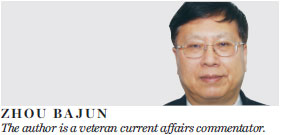How will Guangdong Free Trade Zone affect HK?
Updated: 2015-03-18 06:36
By Zhou Bajun(HK Edition)
|
|||||||||
The Guangdong Free Trade Zone was officially launched today (Wednesday). It covers 116 square kilometers, including Guangzhou's Nansha New Area, Qianhai and Shekou in Shenzhen as well as Hengqin in Zhuhai. It can be compared with the Shanghai Free Trade Zone as well as other free trade zones in Tianjin and Fujian. The Guangdong Free Trade Zone will facilitate greater cross-border collaboration with Hong Kong and Macao.
At a National People's Congress' meeting Shanghai Mayor Yang Xiong declared that the city would announce new free-trade zone initiatives this year. This will include policies to ensure greater cooperation with Hong Kong. Yet, economic integration between Guangdong and Hong Kong has obviously gone far beyond economic cooperation between Shanghai and Hong Kong.
Between the mid-1980s and the mid-1990s, Hong Kong and Guangdong created an economic integration model. It has been referred to as the "front shop, back factory". Over the past decade, under the framework of the Closer Economic Partnership Arrangement (CEPA), both sides have undertaken liberalization of the trade of goods. Currently, Hong Kong and Guangdong are carrying out liberalization of the trade in services. This year, a new initiative for financial integration - the Hong Kong and Shenzhen stock market trading interconnection mechanism - will be established. The process of economic integration across the Shenzhen River is unstoppable.
But, there have been some obstacles to this process from the Hong Kong's opposition camp. Recently, radical opposition groups have waged anti-mainland protests - particularly in areas of the New Territories adjacent to Shenzhen. On March 8, protests against mainlanders turned violent. The demonstrators insulted, hit and kicked passers-by, checked the goods they were carrying and stopped buses from operating normally. Many shops had to close. Secretary for Security Lai Tung-kwok said the protesters' actions were "close to those of rioters". In fact, these protests were not only violent but also a part of a "Hong Kong independence" movement.
Some Hong Kong people sympathize and support these protests. A local commentator wrote, "Whatever our stand on parallel traders or democracy, there's no denying that (some) people in Hong Kong are uneasy over the mainland's influence." Along with economic integration, mainland influences on Hong Kong have definitely amplified. But, turning it into a collision of "Hong Kong people versus mainlanders" doesn't help; instead, it may be harmful to the development of Hong Kong.
Hong Kong should accurately assess the benefits and costs of economic integration with the mainland. For example, only a handful of the 40 million-plus annual mainland visitors cause inconvenience to Hong Kong residents. Most of them have helped keep our economy afloat without incident.
Since October 2003, mainland visitors have contributed to Hong Kong's economic development. Following a considerable drop in mainland visitors, our retail sales plunged 14.6 percent in January. This is the sharpest fall since 2003 in the aftermath of the SARS epidemic. A government spokesman explained that January's figures might have been affected by the timing of the Lunar New Year. But the drop in mainland visitors due to recent protests has definitely damaged the economy.
Hong Kong should realize that it has been lagging behind Shenzhen. According to a ranking of emerging start-up hubs around the world by well-respected US magazine Inc. Shenzhen was named as a top five start-up hub. Last year, more than 4 percent of Shenzhen's GDP, or about 64 billion yuan ($10.2 billion), was invested in research and development; Yet, Hong Kong invested less than 1 percent. Six emerging industries - biotechnology, the Internet, new energy, new materials, information technology and the cultural and creative industries - contributed 35 percent of Shenzhen's growth. However, the Innovation and Technology Bureau responsible for policy formulation and promoting the development of innovation and technology and information technology in Hong Kong has yet to be established.
Shenzhen has no world-class universities, but many enterprises want to launch innovative businesses there. Hong Kong, despite its leading universities, appears to have missed a chance of becoming an innovation hub. For example, the founder of DJI, the world's largest supplier of civilian drones, is a Hong Kong University of Science and Technology graduate. Initially he wanted to start his company in Hong Kong. But owing to a lack of funding and support from the Hong Kong government, he started his business in Shenzhen.
Whatever Hong Kong's attitude toward the Guangdong Free Trade Zone, the zone will go head. But, if Hong Kong continues to allow the opposition camp and protesters to impede economic integration across the Shenzhen River, this city will lose its leading position. It could become marginalized in the Pan-Pearl River Delta.

(HK Edition 03/18/2015 page11)